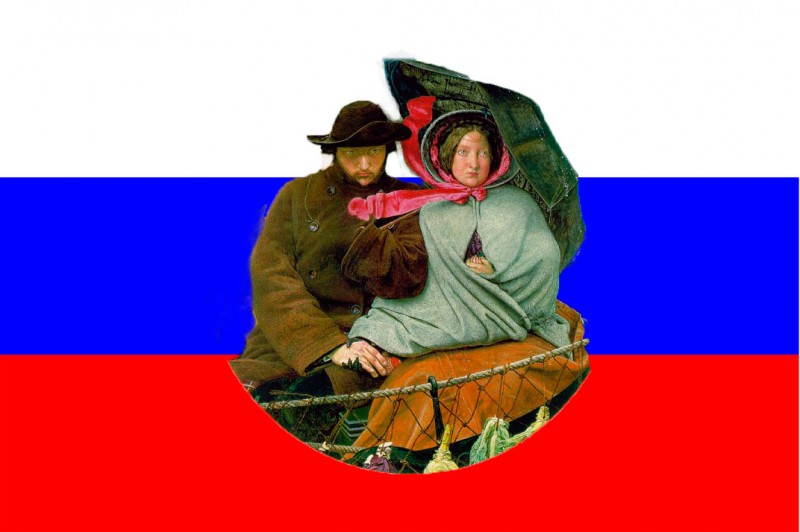
“The Last of England” by Ford Madox Brown, remixed by author. Public domain.
Russia is witnessing a new kind of emigration today. Two factors more than any (the rise of the Internet and the Kremlin’s post-Medvedev crackdown on political freedom) are motivating some of Russia’s most creative citizens to get out of the country. This exodus has been described as the “Fifth Wave” and the “Emigration of Disillusionment,” though relatively few Russians express an interest in leaving, and the far fewer who actually go tend to remain passionately engaged with Russian society and politics.
Last year, two of the most prominent men in Russia’s media world, Oleg Kashin and Rustem Adagamov, left for Europe after experiencing problems at home. Kashin, who was beaten nearly to death in 2010 and subsequently persecuted on the job market, moved to Switzerland. Adagamov, who became involved in what seemed to be trumped-up statutory rape charges, fled to Prague.
Following Kashin’s relocation, Leonid Bershidsky, a former chief editor of the Russian news site Slon.ru, wrote a blog post for Snob.ru, titled, “It’s Time to Forget about Emigration.” In that text, Bershidsky argued that modern technology—particularly the Internet—has shrunk the world to such a degree that our physical location is almost irrelevant. In other words, “emigration” as it’s generally understood has become an obsolete concept. People might leave Russia, but Kashin’s articles and Adagamov’s photographs still populate your Facebook feed, appear on your favorite websites, and flood across Twitter. It doesn’t really matter where you are, says Bershidsky.
Today, June 12, Bershidsky wrote again about emigration—this time his own. A text he says was meant for Snob.ru, but “fate” prevented from appearing there, Bershidsky posted his article on Facebook, announcing that he is leaving Moscow for Berlin. In the post, he says he’s “suffered defeat” and slams Russia’s mainstream media (both Kremlin propaganda and liberal “hobnobbing”) for stifling journalism’s ability to “protect the weak from the strong.” Moreover, German taxes may be three times higher than Russia’s, Bershidsky writes, but at least they won’t be subsidizing Russia’s “theft” of Crimea.
In the last month, two other notable Moscow intellectuals have promoted the idea of leaving Russia. On June 4, Afisha Magazine’s chief editor, Alexander Gorbachev, announced that he is quitting his post to go study journalism in the United States for the next two years. On June 12, Maria Baronova—a former political prisoner and a vocal Putin critic—invited Russians to escape Moscow’s stifling political atmosphere by traveling to Kazakhstan.
In an interview with the website Colta.ru, Gorbachev said that his urge to leave Russia first crystallized with the sentencing of Pussy Riot. In a Facebook post about his departure, Afisha’s chief compared himself to Boris Yeltsin, whose resignation in 1999 is often summed up as “I’m tired and I’m leaving.” It’s not the job at Afisha that’s exhausted Gorbachev, he says, admitting, “It's that I’m tired of life in Russia.”
In Kazakhstan, Baronova says Russians can find good work and plenty of outlets for entrepreneurial creativity. “As you walk in the morning to your office,” she writes, “you’ll [pass buildings] and want instantly to open a couple of shoe repair stores and cafes, running to the mayor’s office with [ideas for] public relations projects and ways to enrich the city’s cultural life.” Perhaps just as importantly, the compulsion to be involved in politics withers away. “Since you’re in a different country,” Baronova explains, “you simply stop worrying about the immediate introduction of honest elections and all that.”
In all the cases above, however, nobody expects to be gone from Russia forever. Indeed, Kashin frequents Moscow more often it seems than the winter snow. Gorbachev, in all likelihood, will move back after his graduate studies in Missouri. Bershidsky and Adagamov maybe have emigrated for longer, but the work that makes them significant to Russian society—their intellectual labor—will still roam the Internet, where their audiences were always.
And this, it seems, is Russia’s new emigration. People leave—to escape, to explore, and to unwind—but nobody really disconnects.









4 comments
Спасибо, хорошо написано.